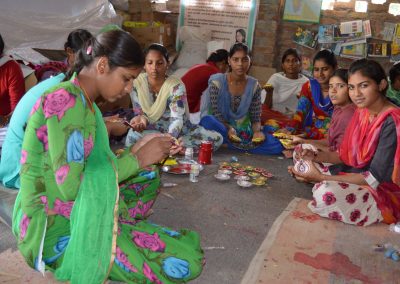Financial and Life Skill education
Programme Background
The project was developed considering the following issues:
Apart from schooling, the next generation ought to be taught life skills which will greatly contribute to their well-being and empower them to meet the challenges of life. Considering the importance of inculcating the habit of savings, values, interpersonal skills including self-awareness, critical/creative thinking, effective communication, interpersonal relationship, leadership, empathy, decision making, financial literacy and entrepreneurship skills among children, organisation implemented a project called “ Financial and Life Skills Education” in 1429 govt. schools in four blocks of Bikaner dist. reaching out to 43,770 school children ( grade 3-8) and 1429 school teachers. The project was implemented with support from Plan and in technical collaboration with MelJol.
To address the mentioned issues, organisation developed, implemented and monitored the project in consultation and with support from donor agency, community members, duty bearers and PRI members.
Location
Partners
Bikaner district


INTERVENTIONS
b) Conduct training of master trainers/staff and schools teacher on financial and life skills education.
c) FELS education provided in 1429 govt. schools by trained teachers.
d) Mid-term Evaluation.
e) Monthly monitoring visits for SIERT and DIET faculty to govt. schools.
f) Workshops for girls on Sexual and Reproductive Health (SRH) and giving skills to make sanitary pad.
g) Entrepreneurship workshops for Deepawali related products.
h) Celebration of International Day for the Girl Child
i) Workshop of children from the children’s group on social entrepreneurship.
j) Workshop of KGBV girls on entrepreneurship skill in KGBV.
k) Competition of FELS children from the children’s group on FELS knowledge, GK, drawing and writing skills.
l) Summer camp on FELS ( Theatre workshop with children)
m) Summer camp on FELS ( Cartoon workshop with children)
n) Summer camp on FELS (Photography workshop with children)
o) Training of adolescent girls on entrepreneurship lab.
p) Training of adolescent girl on making handicraft item/artificial jewellery/sanitary napkins/embroidery
q) Exposure visits of children to financial institutions.
r) Establishment of sanitary pad making unit.
s) Block level workshop with teachers, Headmasters and block level officials for sharing and advocacy of best practices of FELS program.
t) End term evaluation.
IMPACT
After receiving the FELS/entrepreneurship lab trainings, children of 10 FELS clubs have stared their own petty shop (stationary shops)within their school premises with support from School Management Committee (SMC) members, teachers and parents. This initiative has been very much appreciated by all. This initiative will enable children learn to runsmall business, earn profit, induce habit of savings and develop confidence. The members of other children clubs are also discussing with their teachers and school management, the possibility of taking up similar initiatives in near future.
The adolescent girls who attended vocational training courses like making artificial jewellery, handicraft items, embroidery work on fabric, sanitary pads etc have started their own individual and collective shop and are running it successfully and have started earning. They are also reported teaching other village girls the skills so that they too may start their own enterprises. The shops that are currently running are 15 shops of Manihari ( products exclusively for female’s use), 2 handicraft shops, 2 sanitary napkin units, one artificial jewellery, 20 tailoring shops, 5 beauty parlours.
All the 43,770 school children who were part of FELS project have opened their own bank account and most of them are saving their pocket money in their banks. These children have started putting the learning into practice like they remember to put off fans/lights when not in use, remember to close the water taps after using water stand and toilets, taking responsibilities in keeping their school premises clean and watering the trees, taking active part in school activities and managing activities like prayer sessions, library, playground, mid-day meals, school level saving accounts, children clubs etc.






















Leave a Reply
You must be logged in to post a comment.